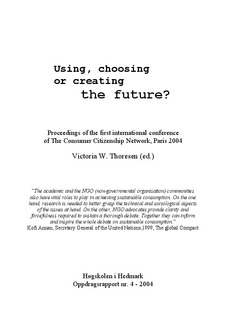| dc.description.abstract | The results of the first year of cooperation amongst the partners of the Consumer
Citizenship Network are reflected in this selection of some of the papers which
were presented at the first annual conference of the Consumer Citizenship
Network (CCN) March 2004. The Consumer Citizenship Network is a thematic network whose goal is to
stimulate dialogue between researchers, educators and civil society as well as
strengthen cooperation in relation to value education, civic training, and
environmental and consumer education. The CCN is an interdisciplinary
network of educators and researchers from 29 countries, and includes
cooperation with UNESCO, UNEP and international citizenship and consumer
organizations. The papers published here represent a wide diversity of approaches to the issues
which constitute consumer citizenship. As with environmental topics, consumer
citizenship issues can be seen from three distinct perspectives: fact-based,
normative and pluralistic. Despite differences of perspective, there is a common
theme running through all the papers in this compilation. This is the recognition
of the need to prepare for the future not only by observing trends but also by
making conscientious choices and contributing to the creation of solutions to the
challenges mankind is facing. There was a general consensus at the CCN
conference that while the events of the present manifest the consequences of
what we do and do not do, time s transformations need not be the result of a
deterministic classical mechanics. They can be new structures, new systems, and
new solutions emerging from the seemingly chaotic encounter of numerous
conflicting elements. Even without being able to recognize the complete image
of the future, we can identify the parameters of visions of preferred tomorrows.
Even without being entirely confident of the outcomes of our endeavours, many
of the participants at the conference expressed the conviction that we can contribute to modifications which will influence the direction development will
take.
The conference and this compilation of the proceedings
Responsible lifestyle choices, increased ecological awareness and just
distribution of resources were central topics at the conference which was hosted
by UNESCO in Paris, France. Participants from 33 countries came together to
look more closely at how the individual in his/her role as a consumer as well as
a citizen, can contribute to global solidarity and sustainable consumption. The
main focus points of the conference were:
* Rethinking extravagance
---consumption patterns in light of global disparities
* Revising responsibilities
---value-based education as a tool
* Reviewing accountability
---participatory democracy in a commercialized world
* Reshaping cooperation
---co-producing and sharing of teaching materials and
learning methods in a global network.
Presentations and discussions at the conference emphasized the need for a
comprehensive review of the fundamental values directing lifestyle choices.
What do individuals want and why? What does improved life quality mean
and how can this be achieved with reduced use of resources? The presentations
and discussions concurred as to the pressing need for changes in present
consumption patterns in light of global disparities and environmental impacts.
Such changes require accurate and accessible information, alternative products,
and the ability and willingness to withstand commercial pressure. Systematic,
cohesive value-based education was recommended as one of several necessary
tools for helping individuals better understand their responsibilities as consumer
citizens. During the conference a variety of methods such as service learning,
scenarios, cases, and future workshops were discussed. | en |
